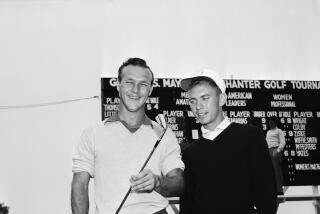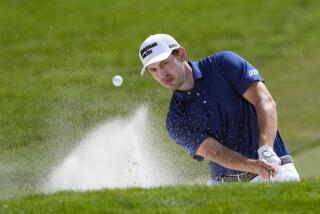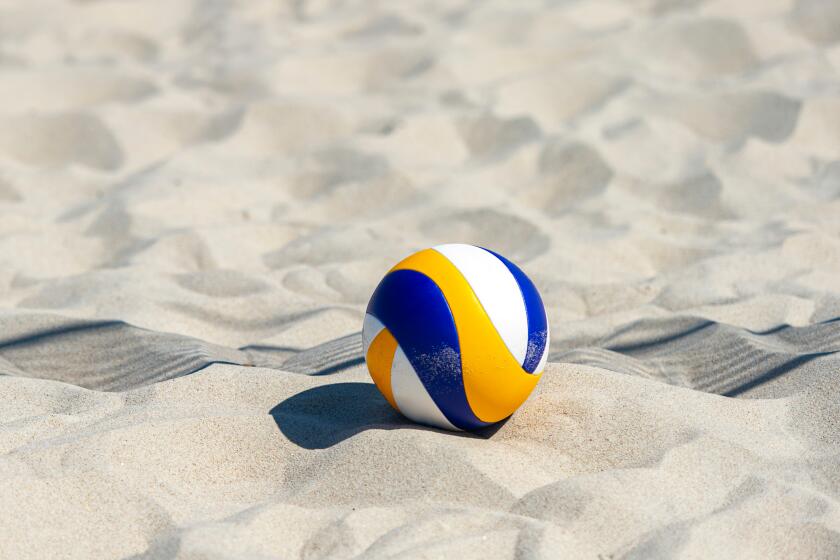Victoria Pro Has More Than Hooks, Slices on His Mind : Golf: Determination took Eugene Hardy out of the cotton fields. Now the top teacher at Carson’s county course wants to give others a hand.
- Share via
Eugene Hardy crushed a mammoth drive off the first tee at Victoria Park County Golf Course in Carson--a “big ball,” exclaimed the other members of his threesome, who watched it land 50 yards past their own drives in the middle of an uneven fairway in view of the noisy San Diego Freeway.
A satisfying shot. But Hardy, one of only three black teaching golf pros in Southern California, has been searching for deeper satisfactions lately, and that’s what concerned him most as he walked up to hit his approach to the green. As head pro at Victoria, Hardy hopes to make up for lost time.
“I don’t feel I’ve done enough to contribute to mankind,” said Hardy, wearing a black sweater and a purple shirt, his golf bag slung over his shoulder.
“Perhaps (giving something back) is a lofty goal,” he said, “but in Los Angeles everyone is out for a buck here.”
The Victoria course is a long way from Tunica County, Miss., where Hardy grew up, but both places have witnessed his steely determination.
The oldest of eight children, Hardy picked cotton and plowed fields behind teams of mules on the family farm. He experienced the injustice of racism in the early 1960s: He wanted to be a policeman, but the only job he could get was as a hotel porter in Memphis.
Hardy joined the Air Force to escape the South. He succeeded in that, he said, but missed most of the civil rights movement in the United States. After leaving the service, for nearly 20 years he was a California highway patrolman, “maybe the only state representative people ever see.”
These days, as a minority member of the 1,300-member Southern California Professional Golf Assn., Hardy said he may be in a position to repay what he sees as his debt to society.
“Lots of people of my race have had possibilities and aspirations, and they haven’t realized anything near what they wanted,” he said.
“In a way, I’ve been lucky. I haven’t held a job I didn’t like.”
Hardy’s time on the farm and in the Air Force taught him the value of hard work, a credo he has applied to his job as head pro.
“He’s done a tremendous job there,” said John Johnson, the golf coach at nearby Cal State Dominguez Hills, whose team often practices at Victoria. “He really works at his job.”
Hardy has streamlined his lesson schedule and, according to Johnson, made Victoria a more popular course. Before Hardy came three years ago, the coach said, its professional staff had a high turnover rate.
“His organizational ability has really shown,” Johnson said.
So has his candor. Hardy is at odds with other teaching pros whose assembly-line lessons “smack of commercialism.”
“There are a lot of guys in the industry where lessons are the only income they have,” he said. “I question whether the public is getting its money’s worth.”
Hardy charges $25 for a half-hour lesson but often spends a full hour with a pupil without charging for the extra time. He has encouraged high school golf teams to play at Victoria and is known to pass out free instructional tips for the asking.
“Golf is a business,” he warned. “There is a lot of room for larceny as far as the public goes.”
Hardy was 32 when his interest in golf burgeoned. In 1972, while assigned to the Highway Patrol’s Torrance substation, he was invited to play a free round in an office tournament in Chino.
A single booming tee shot later, “I was hooked,” Hardy said.
“I was playing with a borrowed set of clubs. They belonged to my auto mechanic. I must have hit that drive 300 yards.”
Monday tournaments quickly became a habit, and later Hardy played on several Southern California amateur tours.
In 1975, married with two children and working full time for the CHP, Hardy opted to expand on a community college degree he had earned in Mississippi a dozen years before. He enrolled at Cal State Dominguez Hills as a full-time student, going to class during the day, playing golf in the afternoon and working the graveyard shift for the CHP.
“It was the toughest doggone thing I’ve done,” said Hardy, who admitted falling asleep in the passenger seat of a patrol car on more than one occasion.
In 1977, Hardy approached Johnson about a tryout for the Toro golf team.
“I was absolutely amazed,” Johnson said. “But I could tell this guy had a tremendous amount of determination. I knew he was going to make it.”
Hardy became Johnson’s No. 3 player.
“He was a very, very good player,” the coach said, “but he just didn’t have the time to devote to the game” to be No. 1.
His grueling schedule eventually wrecked Hardy’s marriage, and he chain-smoked up a storm. Golf became even more of an outlet.
“I got into this business in a non-traditional method,” he said. “It was merely a hobby for me.”
Hardy’s swing, which Johnson described as “very compact,” isn’t the prettiest around. But it met with instant success, which he demonstrated during a recent nine-hole round at Victoria.
Said Johnson: “There is very little that can go wrong with his swing.”
Hardy taught himself how to play by reading books.
“Over the years I’ve pieced together what has worked for me and thrown out what didn’t,” he said. “A genius can’t play this game. It’s a game of muscle memory.”
After his divorce in 1977, Hardy dropped out of school and, he said, “retreated within (myself). I would play golf and work, play golf and work.”
A heart attack in 1986 furthered the retreat. He retired from the Highway Patrol with a full pension, and when he was well enough to pick up a club, the Carson resident went to Victoria to hit a few balls. There he met Jim Duffin, who operates National Golf and Tennis, which runs the course for Los Angeles County.
“He was an excellent golfer, a member of the men’s club,” Duffin said. “We struck up a friendship.”
Duffin offered Hardy a managerial job, which he turned down.
“I wasn’t looking for a job at the time,” Hardy said. “I wanted to chill out and recuperate.”
Eventually, Hardy did some part-time work for Duffin. Then, at Duffin’s urging, he earned his Professional Golf Assn. apprentice card, which allowed him to become a teaching pro. In 1987, Duffin offered Hardy the head job at Victoria.
Duffin expects Hardy to earn his Class A card when he completes the full PGA school for teaching pros.
“With what he knows about business, Gene is doing an excellent job” at Victoria, Duffin said.
He explained that Hardy “doesn’t know merchandising very well. He hadn’t done it before.” But Duffin added that Hardy “will be great” at merchandising once he completes the PGA school.
Ironically, now that he is a head pro, Hardy plays less golf than he used to. “Very few club pros can get out to play because they are attending to other things,” he said.
Back at Victoria’s first hole, Hardy pulled out a long iron and again unleashed that compact swing. The ball headed for the middle of the green, dropped out of the sky and seemed to disappear.
But Hardy found it on the fringe of the green, not far from where he wanted it to go--just like all the other pretty shots he hit that day.
He said: “I felt in my heart, as I played more and more, that this was the game for me.”
More to Read
Go beyond the scoreboard
Get the latest on L.A.'s teams in the daily Sports Report newsletter.
You may occasionally receive promotional content from the Los Angeles Times.










